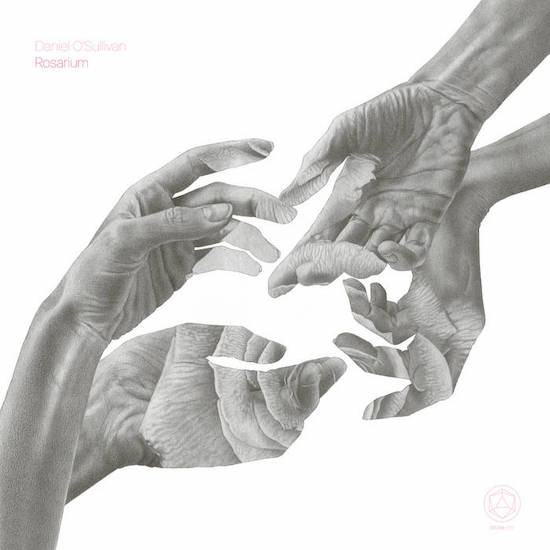Throughout history, the verdant gardens of art and literature have been cultivated with roses; those enduring symbols of love, beauty and mysticism. These themes will be familiar to anyone who has listened to the disparate works of composer, songwriter and multi-instrumentalist Daniel O’Sullivan. And they are subtly alive here, too, but Rosarium represents a significant shift in its architect’s ongoing musical evolution. Putting aside the loquacious avant-pop and library music vignettes of recent albums, O’Sullivan has crafted a suite of refined chamber music(k) – written over the course of five years for the innovative Belgian post-classical ensemble Echo Collective – placing the sonic focus firmly on texture, tenderness and counterpoint.
In its ornate weaves of stately strings, balm-like vocal mantras, strummed harp and demure woodwind which reflect its unhurried gestation, Rosarium maps out enclosures ripe and rippling with enchantment, reminiscent of the bucolic minimalist folklores of Penguin Cafe Orchestra, Balmorhea and the pastoral idylls of Virginia Astley’s From Gardens Where We Feel Secure. Cello, violin and viola accompany an enigmatic poetry reading from O’Sullivan’s daughter during ‘The Lights That Guard The World’, a glorious curtain-raiser which provides a scintillating foretaste of the expressive arrangements to follow. Young Ivy’s esoteric recitals also crop up on the swirling, hypnotic ‘Waterbearer’ and her contributions encapsulate this album’s finely-balanced tightrope walk, poised between temporal and transcendent concerns.
As the lush melodies of ‘The Violet Panoply’, ‘Haniel’ and ‘Celestograph’ unfold, it’s as if O’Sullivan were opening windows onto a series of fantastical pantheist scenarios, a succession of whimsical soap-operas played out in the pages of Lucy M Boston or Kenji Miyazawa. But he is also looking deep within himself here. Rosarium was fashioned from the forced confinement of the global pandemic, its composer locked in an intensive period of introspection, spent reassessing his place in this and other worlds, filtering through dream journeys and negotiating the pleasurable rigours of parenthood.
With time and space to fill, and with so much with which to fill it, O’Sullivan would be forgiven for ceding to some of the musical grandstanding that occasionally marked previous releases. But Rosarium comes entirely pared back and de-thorned, its exquisite prayer forms constituting a contemporary kind of devotional music in keeping with another interpretation of its album title – derived from the Latin word for ‘rosary’, or ‘crown of roses’ – and the empyrean visions of an artist captured here in full bloom.


